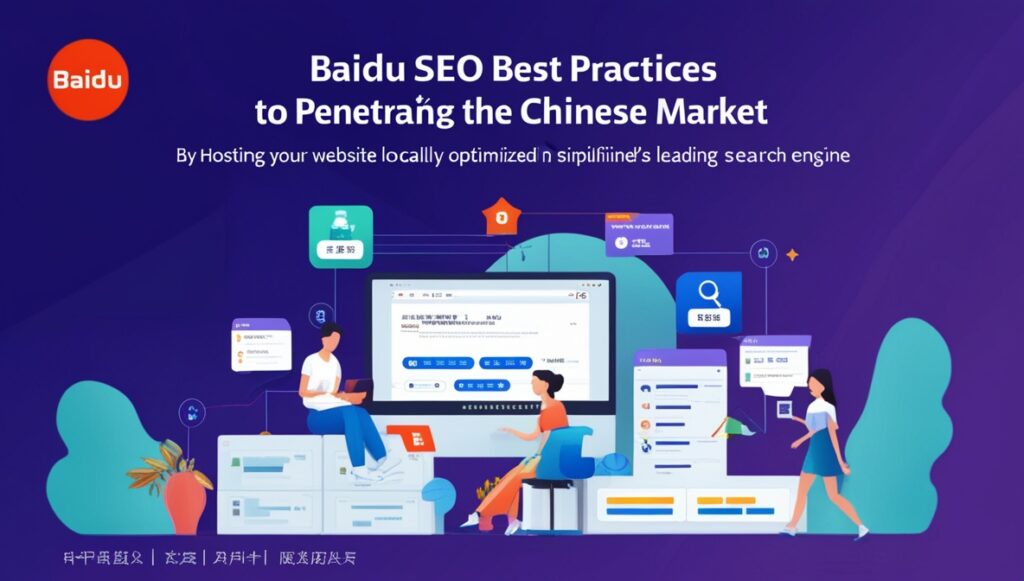
In the realm of digital marketing, SEO strategies tailored for specific platforms can significantly enhance your online presence. In China, where Baidu dominates the search engine market with a share exceeding 70%, understanding Baidu SEO best practices is essential for businesses looking to succeed in this competitive landscape. This article provides a comprehensive guide to optimizing your website for Baidu, ensuring better rankings, increased visibility, and improved conversions.
Understanding Baidu: Why It’s Different
1. Baidu’s Unique Ecosystem
Baidu operates within China’s unique internet ecosystem, which is shaped by regulations like the Great Firewall. Unlike Google, Baidu prioritizes local content and heavily integrates with other Baidu-owned platforms such as Baidu Baike (a Wikipedia equivalent) and Baidu Tieba (a forum-based community).
2. Preference for Chinese Content
Baidu’s algorithms favor Simplified Chinese content hosted on servers located within China. For businesses aiming to rank on Baidu, creating localized, high-quality content is paramount.
3. Stricter Censorship Policies
Content on Baidu must comply with China’s strict internet regulations. Websites containing sensitive or politically inappropriate content risk being penalized or removed.
Key Differences Between Baidu and Google SEO

| Factor | Baidu | |
|---|---|---|
| Language Preference | Simplified Chinese | Multilingual |
| Hosting | Strong preference for China-based servers | No geographic hosting bias |
| Backlinks | Quantity-focused | Quality-focused |
| Indexing Speed | Slower | Faster |
| Analytics | Baidu Tongji | Google Analytics |
Understanding these differences is crucial when developing a Baidu SEO strategy.
Baidu SEO Best Practices
1. Host Your Website in China
Hosting your website on a server within mainland China improves loading speeds for local users and aligns with Baidu’s ranking preferences. Additionally, obtaining an ICP (Internet Content Provider) license, required for websites hosted in China, demonstrates compliance with local regulations.
2. Focus on Simplified Chinese Content
Baidu strongly favors content written in Simplified Chinese. Translate and localize your content effectively, ensuring that it resonates with the local audience and includes culturally relevant references.
3. Keyword Optimization for Baidu
- Keyword Research: Use Baidu’s own tools, such as Baidu Index, to identify high-performing keywords. Tailor your strategy to focus on short, generic keywords, as long-tail keywords are less commonly used.
- On-Page Optimization: Include keywords in critical locations such as:
- Title tags
- Meta descriptions
- Headers (H1, H2)
- Alt attributes of images
- URLs
4. Leverage Baidu-Specific Tools
Baidu provides a suite of tools to help improve your SEO:
- Baidu Tongji (Analytics): Monitor your website’s performance on Baidu.
- Baidu Webmaster Tools: Submit sitemaps, track backlinks, and resolve indexing issues.
- Baidu Ads: A paid platform that complements organic SEO efforts by driving additional traffic.
5. Optimize for Mobile Users
With the majority of Chinese internet users accessing content via mobile devices, a mobile-first approach is non-negotiable. Ensure your website:
- Uses responsive design.
- Loads quickly on mobile devices.
- Provides an excellent user experience tailored to mobile navigation.
6. Prioritize Content Quality
Baidu rewards websites with fresh, high-quality content. To achieve this:
- Regularly publish new articles, blogs, or updates.
- Avoid duplicate content, which can result in penalties.
- Include Baidu-friendly multimedia elements, such as images and videos, hosted on Baidu’s platforms.
7. Emphasize Local Backlinks
Baidu values the quantity of backlinks but also considers their relevance. Focus on:
- Building relationships with local Chinese websites for backlinks.
- Leveraging Baidu’s ecosystem, such as Baidu Tieba or Baidu Zhihu, for additional links.
- Avoiding spammy links, as Baidu penalizes black-hat SEO techniques.
8. Submit a Sitemap to Baidu
A sitemap ensures that Baidu’s crawlers can index your website efficiently. Submit your XML sitemap via Baidu Webmaster Tools to facilitate indexing.
9. Use Structured Data
While structured data isn’t as commonly used on Baidu as on Google, incorporating it can still improve your site’s search appearance. Use JSON-LD to enhance how Baidu displays your website in search results.
10. Monitor and Improve User Experience
Baidu takes user experience seriously. Enhance your UX by:
- Reducing page loading times.
- Ensuring intuitive site navigation.
- Optimizing internal linking structures to improve user engagement and session duration.
Common Challenges and How to Overcome Them
1. Censorship and Compliance
- Challenge: Navigating strict content regulations.
- Solution: Partner with a local expert to ensure compliance with Chinese laws.
2. Slow Indexing
- Challenge: Baidu’s crawlers can be slower compared to Google’s.
- Solution: Regularly update your site and use Baidu Webmaster Tools to request indexing.
3. Algorithm Transparency
- Challenge: Baidu’s algorithms are less transparent than Google’s.
- Solution: Stay informed by following trusted Baidu SEO blogs and updates.
Advanced Tactics for Baidu SEO
1. Utilize Baidu PPC (Pay-Per-Click)
Baidu PPC ads can complement your organic SEO strategy. Running paid campaigns for high-volume keywords can drive immediate traffic while you work on long-term SEO goals.
2. Leverage Baidu Baike
Baidu Baike (similar to Wikipedia) often appears at the top of search results. Create and optimize a Baike page for your brand to gain additional visibility.
3. Optimize for Voice Search
Voice search is growing rapidly in China. Optimize your content for conversational queries by including natural language keywords and answering common questions in your niche.
Case Study: Successful Baidu SEO Implementation
A Hong Kong-based e-commerce company partnered with a local digital marketing agency to enhance its Baidu SEO. Here’s how they achieved a 40% increase in organic traffic within six months:
- Hosted their website on a China-based server and obtained an ICP license.
- Published localized blog content targeting Simplified Chinese keywords.
- Built backlinks through collaborations with Chinese influencers and local forums.
- Used Baidu Ads to drive initial traffic and boost visibility for their products.
This holistic approach demonstrated the effectiveness of Baidu SEO best practices when applied strategically.
Conclusion

Mastering Baidu SEO best practices is essential for businesses looking to penetrate the Chinese market. By hosting your website locally, optimizing content in Simplified Chinese, leveraging Baidu-specific tools, and focusing on user experience, you can significantly improve your rankings and visibility on China’s leading search engine.
If you’re ready to elevate your Baidu SEO strategy and maximize your reach in the Chinese market, Dust Digital Marketing Ltd can help. With years of experience in crafting effective SEO campaigns tailored to Baidu’s unique requirements, we’ll ensure your business stands out in China’s competitive online landscape. Contact us today to get started!

